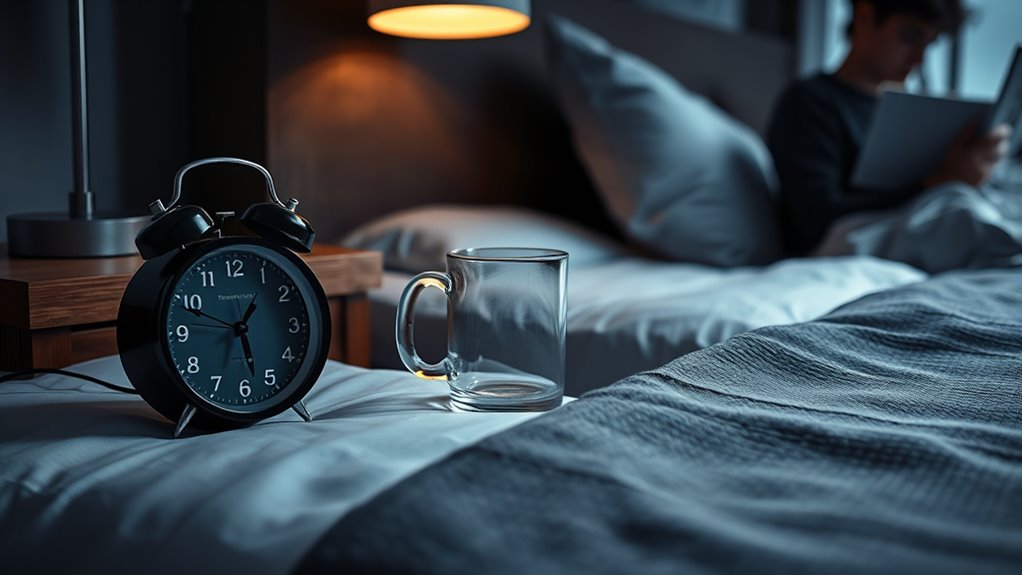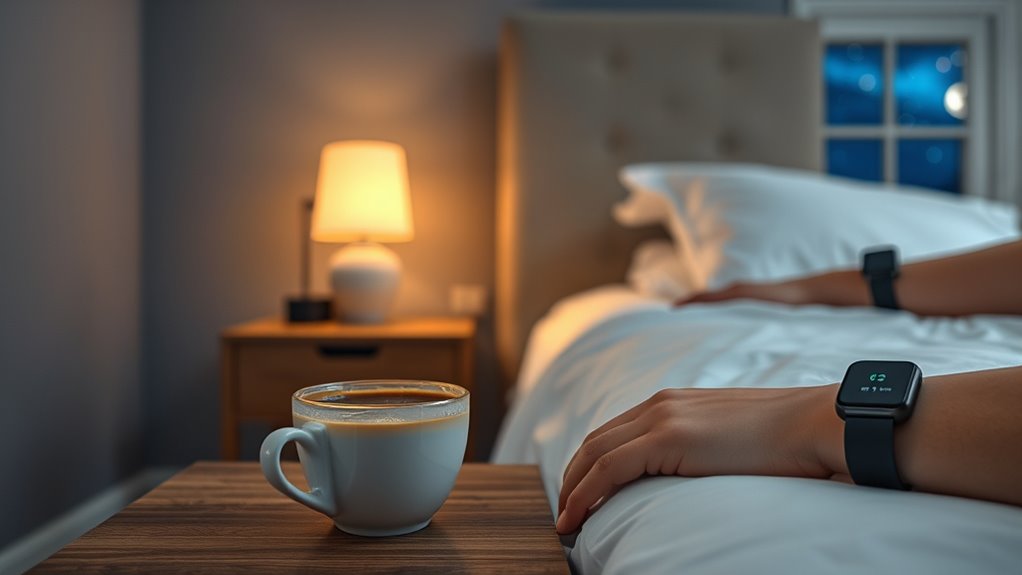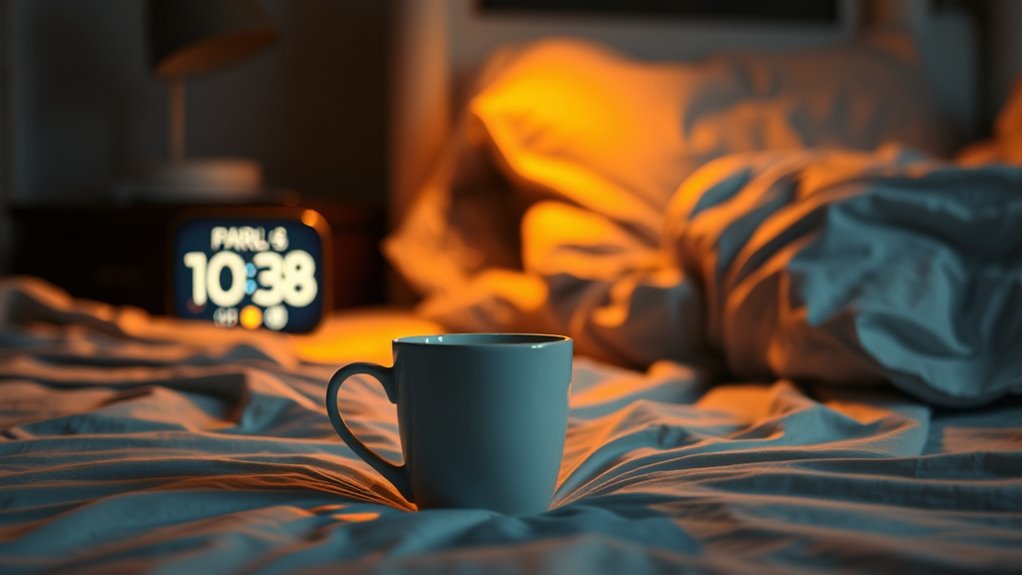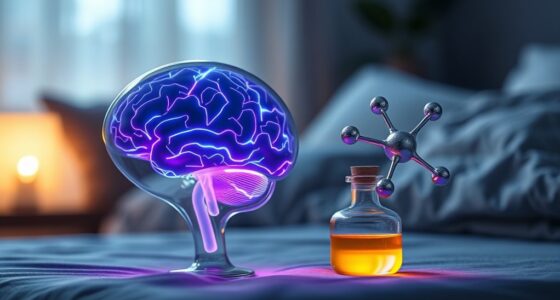When you consume caffeine too close to bedtime, it can markedly disrupt your sleep architecture by suppressing REM sleep and impairing deep, restorative stages like slow-wave sleep. Timing matters because late caffeine intake delays sleep onset and reduces sleep quality, affecting how your sleep cycles progress and your dreams. If you keep track of when you drink caffeine, you’ll discover how adjusting your timing can improve your sleep quality and overall rest.
Key Takeaways
- Late caffeine intake suppresses REM sleep, reducing dream duration and altering sleep cycle progression.
- Consuming caffeine closer to bedtime increases sleep onset latency and causes more fragmented sleep architecture.
- Early-day caffeine has minimal impact on sleep stages, preserving healthy sleep architecture and restorative processes.
- Timing of caffeine affects the balance between REM and non-REM sleep stages, influencing overall sleep quality.
- Properly timed caffeine consumption helps maintain natural sleep cycles and supports better sleep architecture.
How Caffeine Affects Sleep Cycles

Caffeine directly influences your sleep cycles by blocking adenosine receptors that promote sleepiness, making it harder to fall asleep and stay asleep. Your caffeine metabolism determines how quickly your body processes caffeine, affecting how long its effects last. If you metabolize caffeine slowly, its impact on your sleep quality can persist longer, disrupting your ability to rest well. This interference can reduce the duration of deep sleep stages and alter your overall sleep architecture. The closer caffeine intake is to bedtime, the more likely it is to negatively affect your sleep cycles. Understanding your caffeine metabolism helps you gauge how long caffeine stays in your system, enabling you to better manage its influence on your sleep quality and maintain healthier sleep patterns. Additionally, individual differences in metabolic rate can significantly influence how caffeine impacts your sleep.
The Influence of Timing on REM Sleep

Your caffeine intake timing can considerably influence REM sleep, often leading to its suppression if consumed too late. When you drink caffeine closer to bedtime, you may notice fewer dreams and altered dream stages. Understanding how timing affects REM can help you optimize your sleep quality. Additionally, being aware of how caffeine’s effects on sleep architecture interact with your sleep patterns can further enhance your overall rest. Recent studies have also shown that individual differences in metabolism rates can significantly impact how caffeine affects sleep. Notably, recent advancements in machine learning algorithms contribute to understanding individual sleep responses to caffeine, allowing for more personalized recommendations.
Timing and REM Suppression
Since the timing of caffeine intake can critically influence sleep patterns, understanding its effect on REM sleep is essential. Consuming caffeine too late can delay caffeine metabolism, prolonging its presence in your system and leading to REM suppression. This suppression may exacerbate sleep deprivation effects by reducing restorative REM stages, especially if you’re sensitive to caffeine’s influence. To visualize this, consider the table below:
| Caffeine Timing | Impact on REM Sleep |
|---|---|
| Early afternoon | Minimal REM suppression |
| Late afternoon/evening | Significant REM suppression |
| During sleep deprivation | Further REM reduction |
| After waking late at night | Disrupted REM rebound |
Being mindful of when you consume caffeine can help mitigate REM suppression and improve overall sleep quality. Additionally, understanding caffeine metabolism can help you better plan your intake to minimize its impact on sleep. Recognizing how individual differences in metabolic rate can influence caffeine’s duration in your system may also aid in tailoring consumption habits for optimal sleep health.
Caffeine and Dream Stages
Timing your caffeine intake not only affects overall sleep quality but also influences the occurrence and quality of dream stages within REM sleep. When you consume caffeine too late, it can delay sleep stage progression, reducing the time spent in REM and impacting dream recall. This may lead to fewer vivid dreams or less memorable ones, as REM duration shortens. Conversely, caffeine earlier in the day has less effect on REM, allowing natural dream cycles to occur. If you’re trying to enhance dream recall, consider the timing of your caffeine intake carefully, as it can suppress or alter REM sleep patterns. Additionally, understanding sleep cycle dynamics can help you optimize your sleep and dream experiences. By understanding how caffeine influences sleep stage progression, you can better manage your sleep environment for more restorative rest and more memorable dreams. Being mindful of lifestyle choices can also support healthier sleep patterns and enhance overall sleep quality.
Caffeine’s Impact on Deep Sleep Phases

Caffeine consumption can markedly impair deep sleep stages, particularly slow-wave sleep, which is essential for physical restoration and memory consolidation. When you consume caffeine, your body’s caffeine metabolism slows down overnight, prolonging its stimulating effects. This disrupts sleep hormone interaction, especially with melatonin and adenosine, making it harder to reach and maintain deep sleep phases. Additionally, the high pressure from caffeine intake can interfere with sleep architecture, further reducing the quality of restorative sleep. Caffeine’s influence on sleep hormones can also lead to increased night awakenings, fragmenting sleep cycles. Understanding how caffeine affects your sleep hormones and metabolism helps you minimize deep sleep disruption. Timing your caffeine intake, especially later in the day, is important for preserving restorative sleep phases. Recognizing the importance of creative practice in managing daily routines can also help optimize your sleep quality.
Variations in Sleep Latency and Wakefulness

Caffeine’s influence on sleep latency and wakefulness varies depending on when you consume it. When you drink caffeine earlier in the day, your caffeine metabolism can process it more efficiently, often resulting in a smaller impact on your sleep latency. However, if you consume caffeine later, it can markedly delay how quickly you fall asleep and increase wakefulness during the night. This is because caffeine blocks adenosine receptors, making you feel more alert. Your body’s ability to metabolize caffeine affects how long these effects last, meaning slower metabolism can prolong wakefulness and extend sleep latency. Additionally, individual differences in metabolism rates can influence how long caffeine’s effects persist, underscoring the importance of personalized consumption timing. Recognizing these variations can help optimize caffeine intake to minimize sleep disturbances and support overall sleep quality.
Long-term Effects of Caffeine Consumption Patterns

Consistently consuming caffeine over time can lead to dependence, making it harder to feel alert without your usual dose. You might also develop habits that affect your overall sleep quality and daily routines. Understanding these long-term patterns helps you make smarter choices about your caffeine use. Additionally, reliance on caffeine can sometimes mask underlying trust issues, leading to further complications in your daily interactions. Recognizing the behavioral effects of caffeine can help you better manage your consumption habits and their impact on sleep, especially as technology influences cultural attitudes toward rest and productivity.
Caffeine Dependence Risks
While many people enjoy the temporary alertness boost from caffeine, habitual use can lead to dependence over time. As dependence develops, you might notice withdrawal symptoms like headaches, fatigue, irritability, and difficulty concentrating if you skip your usual dose. Long-term reliance increases the risk of needing caffeine to start your day or stay alert, creating a cycle of dependence.
Be aware of these signs:
- Increasing caffeine intake to feel the same effect
- Difficulty functioning without caffeine
- Experiencing withdrawal symptoms without caffeine
- Cravings for caffeinated beverages
- Anxiety or mood swings when not consuming caffeine
Understanding these risks helps you manage your caffeine habits more consciously and avoid unhealthy dependence patterns.
Habit Formation Consequences
Long-term caffeine consumption patterns can considerably influence your brain’s habits and your overall health. Habit formation occurs as your brain adapts to regular caffeine intake, making it part of your daily routine. Over time, this can lead to increased caffeine tolerance, meaning you need higher doses to achieve the same alertness effects. As tolerance develops, you might consume more caffeine, which can disrupt your sleep cycles and contribute to dependency. These changes reinforce habitual behavior, making it harder to break the cycle if you decide to cut back. By understanding how habit formation and caffeine tolerance develop, you can better manage your intake and minimize negative long-term effects on your sleep and health. Additionally, online platforms are increasingly involved in shaping consumption habits and influencing perceptions around caffeine use. Recognizing the role of consumer behavior can help in developing strategies to moderate intake and promote healthier habits. Moreover, consistent caffeine intake can impact sleep architecture, potentially altering REM and non-REM sleep stages over time.
Practical Recommendations for Caffeine Intake and Sleep Health

To maximize the benefits of caffeine without disrupting your sleep, it’s important to time your intake carefully. Understanding your caffeine metabolism helps determine when your body clears caffeine, reducing sleep disruption. Avoid consuming caffeine late in the day; ideally, cut it off at least 6 hours before bedtime. Create a sleep environment that promotes relaxation—dark, quiet, and cool—to counteract any residual effects of caffeine. Incorporating soundscapes and calming techniques can further enhance your sleep quality.
Timing your caffeine intake and creating a relaxing sleep environment helps prevent sleep disruption.
Here are practical tips:
- Limit caffeine after mid-afternoon
- Be mindful of caffeine sources beyond coffee, like tea and energy drinks
- Adjust caffeine intake based on your metabolism speed
- Develop a consistent sleep schedule
- Prioritize a calming sleep environment
These steps support your sleep health while still enjoying caffeine’s benefits.
Frequently Asked Questions
How Does Individual Caffeine Sensitivity Influence Sleep Disruption?
Your sensitivity to caffeine affects how it disrupts your sleep. Genetic predispositions determine how quickly your body metabolizes caffeine, influencing your tolerance. If you’re highly sensitive, even small amounts can cause sleep disturbances, while those with higher tolerance might not notice as much disruption. Knowing your individual tolerance helps you manage intake better, reducing the risk of sleep issues caused by caffeine’s stimulating effects.
Are There Genetic Factors Affecting Caffeine’s Impact on Sleep Architecture?
Imagine a world where your genes influence how caffeine affects your sleep. You might not realize that genetic predispositions and enzyme variability play a role in this process. These genetic factors determine how quickly your body metabolizes caffeine, affecting its impact on sleep architecture. So, your unique genetics can make caffeine more disruptive or less so, highlighting the importance of understanding individual differences in caffeine’s effects on your sleep.
Does Caffeine Withdrawal Affect Sleep Patterns After Regular Consumption?
When you stop regular caffeine intake, your sleep patterns can change due to caffeine withdrawal. Your caffeine metabolism slows down, leading to increased sleep rebound, which means you might experience more REM sleep or deeper sleep stages. These changes happen as your body adjusts to the absence of caffeine, helping restore natural sleep architecture. Expect temporary disruptions, but overall, your sleep quality should improve once withdrawal effects subside.
How Do Age and Gender Modify Caffeine’s Effects on Sleep?
You might think caffeine affects everyone equally, but age-related metabolic changes slow down your body’s ability to process it, making sleep disruptions more likely as you get older. Gender-specific hormonal effects also play a role, with women and men experiencing different sleep disturbances after caffeine intake. So, your age and gender subtly influence how caffeine impacts your sleep, proving once again that one size doesn’t fit all when it comes to coffee’s effects.
Can Caffeine Timing Influence Other Aspects of Sleep Quality Beyond Architecture?
Caffeine timing can definitely influence other aspects of your sleep quality, like sleep depth and dream recall. If you consume caffeine later in the day, it might reduce how deep your sleep gets, making you feel less rested. Additionally, late caffeine intake can increase dream recall, possibly because lighter sleep stages are more active. To improve overall sleep, consider adjusting caffeine consumption earlier in the day.
Conclusion
If you think caffeine’s just a morning pick-me-up, think again. Your late-day latte could be sabotaging your entire night, turning your dreams into nightmares and your deep sleep into a shallow, restless mess. By timing your caffeine carefully, you can avoid turning your sleep into a chaotic circus. Don’t let caffeine hijack your precious sleep cycle—take control now, or risk your nights becoming a never-ending battle of wakefulness versus exhaustion!









